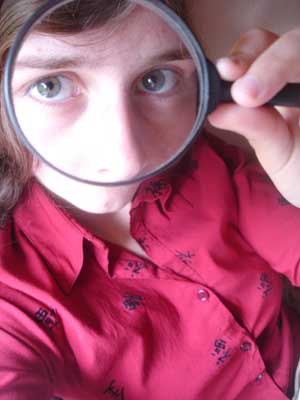Rational? I Think Not
Written by David Dylan
In elementary school, and unfortunatelyoften later too, children are subjected to a very simplistic view ofhistory. There is the time before the middle ages (or “darkages”), there is the medieval period, and there is after. Ifthey are lucky, the later period gets chopped up in Renaissance, somestuff after and industrial period. Then most of the modern era getsglossed over so the teacher can talk about Vietnam.

It is good to be remembered.
On my first day as history major aprofessor told us “Please forget everything about history youwere taught in school”.
The impression most people are leftwith is that history consists of first a load of guys in toga's doinga lot of thinking and philosophy, then a big meltdown and a bigperiod of time in which nothing happened but burning of witches andheretics by people who thought the world was flat, and then a slowemergence of modern thought. And of course these days we are wellaway from the irrational flat-worlders. We have science!
I could go on to lecture about how thisis wrong on pretty much every level.
I could expose the enlightenedclassical thinkers for the god-bothering zealots they were.
I could point out the important centresof thought and learning in medieval Europe; maybe even make a detourpast the middle-east where they were even better at it for a while.
I could point out that the Renaissancewas a time in which many 'modern' ideas were actually discarded infavour of stuff guys in togas thought was just so true many centuriesbefore or how modern medicine was set back ages by the adoption ofclassic doctrine which was based on religion rather than observationand scientific method.

I see your problem, too much water, not enough fire. Here, light one up ...
I could point out that most medievalwitch-trials were conducted by men who were trying to be fair andscientific to the point that most tribunals never actually condemneda witch at all. Or how more witches were burned in the 16thand 17th century, well after we'd supposedly shrugged offthe clouded thinking of the dark ages.
I could. But I won't.
The point I'm trying to make is thatduring the so-called 'rebirth' a load of self-important guys starteddissing the previous centuries by calling them the 'dark ages'.
They felt that the Roman empire hadbeen the shit when it came to all the important stuff like art andscience.
When the Western Roman empire startedto slowly degrade, it retreated from many parts of Europe (or waskicked out). So these guys figured; everything that went wrongafterwards was because we 'lost' all this Roman knowledge, the times'darkened'.
They sortof ignored the fact that whatthe Romans left behind was, well, Roman. Even those feared Visigothswho supposedly brought down the empire? Well, turns out theyconsidered themselves Roman. But hey, what these guys meant was thatwe should be making making white statues (because they thought theoriginals were white) and paintings with (incorrect) perspective.
Not that the Romans were any good atthat, they mostly copied Greek art, badly.
So these self-righteous guys liked togo around lamenting how we lost all this classical wisdom and theshining example of rational classical thought. In Byzantine/Istanbulpeople sorta went 'coohee, over here!' until they were conquered bysome dick sultan in 1453, but that wasn't really the west, and theyhardly wore toga's at all.
These smartass dicks liked to thinkthat we'd somehow abandoned rational thought when their idea of Romewent 'poof'. They started to quote the classics, studied philosophy(no small thanks to that dark ages stalwart, the Roman Catholicchurch, for maintaining all those libraries) and alchemy, theycalled this 'science' and the church was a big dumb poopy-head.
And from that we derive some sillynotion that nowadays we are 'rational'.
I call bullshit.
Rationality
Merriam-Webster defines “rational”thus:
a : having reason or understandingb : relating to, based on, or agreeableto reason : reasonable <a rational explanation> <rationalbehavior>
Rational behaviour is making thatchoice which offers the best possible chances for the desiredoutcome, based on the observed facts.

I observe the fact that you are not getting laid untill you shave.
If the observed facts are fewer, or ifyou are told 'observed' facts which are not true, you basing youractions on them is still rational. Wrong, but rational.
From this premise it follows that, onthe whole, medieval man was no less rational than we are.
The popular notion is that medieval menwere dirty, ignorant and superstitious. And they were, compared tomodern man. But they weren't irrational. They were ignorant. Theysimply did not know a lot of stuff we think we know today. They hadno notion of bacteria, for example, because they couldn't make thequality glass needed for the high grade optics required to see them.But they were well aware that infected wounds killed you, and thatdirt played a role there somewhere.
So they made shit up? Out of thin air?Well, not really. Of course they believed a lot of silly stuff, butmost of that silly stuff was believed by old men who never wentoutside. Those were the men who wrote stuff down. Your averagefarmer... well, he just knew that dirt made you ill. He knew a woundcould get infected and kill you. And he knew that a male cow and afemale cow had to put bits of the one into the other to make littlebaby cows. So they bathed. Not a whole lot, once a week or so becausecatching a cold could kill you. Still, they were cleaner than our owngrandparents, who washed at the sink, at best. (Many cultures, likethe 'Vikings', were known to wash or bathe daily.)
If you factor in how little thesepeople actually understood of the world, you could say they were asrational as your most boring professor. They had to be, to survive.People living off the land practice a scientific method intuitively;they observe and they act on what they see. Priests could talk aboutresting on a Sunday all they liked, if a certain flower hung itspetals it meant a storm was coming and they brought the harvest in.(Just guessing here, I know shit about flowers.)

Hmmm... cloud cover, maybe some light rain ...
Of course they didn't know what causedthe storm, but since learned men were telling them it was done byGod, they figured it was perfectly rational to pray to this God toplease wait a bit so they could get the wheat stored.
It took a certain wealth to beirrational. The sort of wealth that meant you could stay indoors andnot worry about baby cows, flowers and harvests. Unfortunately, thiswealth also meant you had time to write your silly thoughts down, andthat is what survives of those times. Silly notions by silly guys whonever did a real day's work for a living.
The church also wasn't some biginstitution that set out to kill science dead. Quite the contrary,the churches were centres of learning and science. Just as long as,you know, you didn't bite the hand that fed you. Sure, the earthrevolves around the sun... just don't say it, ok? We've told allthese people otherwise and shit.
It's a lot like the modern debate aboutcreationism; science sometimes goes directly against what's in theBible, or what some guys think should be in the Bible in any case.It's not new, but it's not old either.
Medieval man was absolutely sure therewas a god. Being an 'atheist' meant you didn't go to church. Denyingthe existence of God was like claiming there was no sky. Absolutelyunthinkable. Meanwhile, people didn't bother God much, and all theywanted from God was that he didn't bother them. Most people didn'teven really know what the Bible said, it not having been translatedfrom Latin and all. And that's another thing; those silly thingsmedieval man believed? Look at them as priest's ways of explainingscience (because it was the priests doing science) to people whoseonly frame of reference was a half-understood theology and a lot ofcommon folk wisdom. Put yourself in the shoes of people with nomicroscopes, no CAT scan, no weather channel and this rock solidknowledge of a God out there ruling it all anyway. Suddenly theydon't seem so irrational, just, well ... ignorant, in the true sense;people who didn't know a lot of shit we do think we know today.
God's absolute rule was reasonable tothem. What they observed around them was reasonable. From theirperspective we modern man are probably some weird hippies believingstrange esoteric stuff. And then I'm only referring to actualscience.
Because we are silly hippies, believingstrange esoteric stuff.

Class, I'll be your physics instructor ...
We live in the most irrational times.
I use medieval man as an examplebecause they get slandered the most. When people need a way toexpress their disdain for something they deem backwards orirrational, they will refer to the 'dark ages'. The mere term 'darkages' itself is a slander. Those were people without a lot of thescience we have today. They can be excused for thinking the world wasflat, which by the way, they didn't.
What excuse do we have? Not a wholelot, really. But we worship angels, fear demons and are superstitiousas hell. We just give it different names. And our greatest sinagainst rationality is the overt and explicit denouncing ofrationality itself.
Modern irrationality.
As an Objectivist who hangs out withcollege guys (because that's where the college girls are) I findmyself debating philosophy (on a very rudimentary level) and politicsa lot. You'd think I'd get some tough competition from ourintellectual elite, but no. Usually the debate ends with my opponentaccusing me of having an unfair advantage because I know all thefacts. It's not about the facts, they argue, but about how you feelabout things. Socialism may not work, it may not actually produce thegreatest amount of good to the greatest amount of people, but itpromises to and that just 'feels right'.
We are all biased
Look around you and count all thepeople who believe things that can't be proven in any way, because itresonates well with their world view. I don't mean Christianity orany other major religion; that's religion. I mean stuff they presentas fact. Daily stuff. Odds are you'll know a few.
One major problem is that everyscientist, every doctorate candidate has to publish. Shit to publishabout doesn't roll around every day out of the blue, so some prettyoutrageous shit gets published. Some of it is even outrightfraudulent. But the press likes to pick up on the juiciest shit andunless some judge makes them, they don't retract much. But even ifthey do, odds are no one hears about it.http://www.badscience.net/2011/01/none-of-your-damn-business/
And when they do hear about it, peopletend to ignore information that doesn't jive with what they feelshould be true. People also tend to give more weight to the first bitof information they receive, and less to later, possiblycontradictory, information.
And then there's the well documentedtendency people have to simply make up evidence to support theirposition. People also tend to see patterns where there are none.
Let's face it, us humans, we aren't sogood at thinking straight.
All the facts
But still, we have science and stuff,right? People with big brains and white lab coats who sit around allday and make sure we don't believe the world is flat, right? Well,yeah. But we tend to overestimate how much of science we actuallyunderstand. Besides, reading up on the facts is, like, hard work.
Since the seventies things have gotteneven worse, with schools shifting emphasis from knowing to feeling.Where it used to be that schools made you learn shit, and understandhow stuff worked kinda, these days schools spend most of their timemoulding us into good little citizens and focussing on what we 'feel'about stuff. And of course, we should 'feel' how the teachers thinkis right.
I have actually been called toprofessor's offices to justify my politics. One told me, flatoutright, that he wasn't there to train right-wingers in academicthought. I of course, flat outright replied that he'd taken my moneyand should damn well teach his stuff.
Don't get me started on the weird shitI encountered in school.
Sociology is a serious major thesedays, for crying out loud. Academia has had it's waters seriouslymuddied by woolly thinking and the scourge of the baby-boomer. Andthis 'feel' based thinking permeates out into society. It serves alot of people all too well. Politicians will build support onemotions rather than fact. 'For the children', you know.
Coupled with the fact that most peopleactually know jack shit about stuff, and that reporters oftenknowingly lie and what we have is a society based on 'should be' andnot 'is'.
On my dinner table I have a copy of'Elsevier', once a bastion of reasonable thought and semi-truthfulreporting amidst the many, many, partisan and outright sensationalistdumb-it-down-for-the-masses magazines published here in theNetherlands. In it is an editorial. In the editorial the editor flatout states that the person who recently went on a shooting spree hada permit for a full-auto rifle he supposedly used. There was noambiguity in the terms he used, no mistaking the one for the othersince all scary looking guns are scary, none. He used a term whichcan only mean full auto. He then used that as basis for arguingstricter gun laws.
There is just one problem I have withthis. It is a lie. He knew it was a lie when he wrote it. How can Itell?
You don't get permits for full auto inthe Netherlands. Ever. This was even the pivotal point in anotherarticle, in the same issue.

Do you have a permit for that hand?
Stuff like this goes on all the time.But even honest reporters (insofar as that's not an oxymoron) willdefend that sort of thing, you see; it was an editorial. Editorialsaren't 'reporting', they are 'opinion'. The idea that even opinionshould have a basis in fact is seriously out of vogue. Opinion isabout 'how you feel'. That's what we learned in school. How doesJohnny feel about the subject matter? Tell us your thoughts Johnny...but not the facts. Facts stifle a child's growth.

Teacher says I need to express my emotions more.
I wish I was making this shit up. But Iwas taught this in my didactics lectures.
Irrational bullshit rules the day

If I wasn't a rational being, I would kill Darwin for suggesting those losers are related to me.
I asked you to think about how manypeople you know who believe stuff that can't be proven. I'll nowillustrate.
Big corporations are intrinsicallyevil. It just 'stands to reason'. Nothing can grow that big and keepits hands clean, right? We instinctively fear what's more powerfulthan us, those with more knowledge -especially if we perceive it asshrouded in mystery- and if said entity is also performing someimportant function, like a pharmaceutical company, we are doublycritical. How many people do you know who are absolutely sure that'big pharma' is evil? On the basis of what evidence?
Just think for a moment, then read on.
Big Pharma does not exist. Mostpharmaceutical companies scrape by on the skin of their teeth.Margins are extremely slim and the cost of bringing a new drug tomarket are almost prohibitively high. It takes decades to actuallydevelop a drug, then test it, get it approved (also quite costly) andthen there is the effort involved in making the medical professionaware of the stuff. (I'd call it marketing, which it is, but then I'dmake it seem as if I mean TV ads and such. However you do it, if youhave a product to sell, buyers need to know about it. That's'marketing'. It's a lot broader than a Superbowl ad.) And then,sometimes, they do screw up. Out of stupidity, out of greed, butmostly because sometimes you only find out that people with disease Xand condition Y may (or may not) die if they take drug X inconjunction with drug Z when, to put it bluntly, some do.
Rationally, there is no reason tosuspect any kind of super conspiracy by pharmaceutical companies. Thecold hard evidence, in fact, points to the exact opposite. Notbecause they are all saints. They want to make a buck, just likeStarbucks, just like your local organic market, just like you. Thereis just no real evidence whatsoever that pharmaceutical companies goabout it any better or worse than all of us.
But people love to believe they areevil, and no amount of evidence will sway them from this belief. Itis a comfortable belief. It's a demon. And once such a comfortablebelief takes hold, people will in fact value evidence that supportstheir position higher than evidence to the contrary. In psychologyit's called Confirmation Bias. Of course the media then lies aboutit. (Hostile media Bias.) And evidence is weighed against what'feels' like it's true. (Wishful thinking Bias.)
So, psychology even has names for allthese ways people avoid rational thought. Guess there's somethinggoing on there, eh?
The comfortable demon.

You look like you need a hug.
I called this irrational belief system,which I illustrated with the example of 'Big Pharma' a comfortabledemon. That's because its function is the same as the belief medievalman had in demons; to explain bad stuff happening, give it a patternof sorts you can delude yourself into thinking you can recognize andtherefore avoid if you perform the appropriate ritual. Bad stuff'just happening' is uncomfortable. But rationally, that is what wehave to conclude is what is reality. Your organic market probably hasabout the same chances of killing you (especially now that, it turnsout, organic farming may taint veggies with multi-resistant bacteria)as your pharmacy; very slim, but if you are shit out of luck, it mayhappen.
For the same reason people will gladlybelieve that thousands, if not hundreds of thousands of people allconspired to kill thousands of Americans just so the US could go towar in some shitty-ass country (which used to be our/their ally, bythe way) rather than believe that twelve religious nuts happened topull off hijacking some planes and flying them into two buildingsoddly not designed to withstand that sort of thing.
And they will believe this, even thoughthe evidence of their own eyes could tell them that governments can'teven keep it secret that the president boinks an intern, stuff youraverage Joe manages to hide from his wife.

But American Presidents make us all facepalm, so that's no surprise.
The sheer lunacy of thinking thatanything like that can be done without some part of the chain talkingtoo much in a bar, growing a conscience or someone finding out insome way is paralleled only by the idiocy of thinking any governmenteven needs that sort of thing. The Vietnam war was started over anattack on a ship that, as it turned out, never even fucking happened.Between making some shit up that supposedly happened somewhere faraway, or actually flying remote controlled multi-million dollarairliners into actual occupied buildings, well...
Of course that may be a bit toooutrageous for some people, although according to one media poll 86%of US-Americans question the official account of 9/11. Notsurprising, since ten years in marketing research has taught me thatmost media polls are absolute bullshit. But conspiracy theories arerife, that much is certain.
Once people grab hold of such a belief,they will find evidence for it even in the lack of evidence.
A prominent conspiracy theorist orwhistle-blower happens to die, as people are wont to do every now andthen, and it's 'evidence' that the government hides shit, clearlythey gave the guy cancer to shut him up. But those same evilmurderous guys couldn't quietly pop a cap into Monica Lewinski?
Scientists debunk the bullshit? See! Acover up!
The government tells some Foil-hattedconspiracy blogger to piss off because they have real reporters totalk to about real issues? A cover up! See! They are afraid to talkabout it!
If you dissect many of the commonlyheld beliefs, from the more outrageous yet common (911 conspiracy) tothe very widespread and generally accepted to some degree or other(big Pharma), you find fuck all for actual evidence, but a lot of 'itfeels correct' wishful thinking. They are our comfortable demons.
Angels
On the other end of the spectrum, webelieve in angels, too. There must be a 'good' counterbalance to theevil. If it were just demons, life would be shitty indeed. We needangels, to turn to for aid.

OK, I looked it up for you; it's deffinitely spelled with a "k".
Organic farming is one of those Angels.There is actually no proof whatsoever that this method of farming isany better for humans or the planet than modern methods while thereis ample evidence that it is a non-sustainable method which could noteven feed all of the world's population if we actually destroyed allexisting ecosystems to create farmland.
The basic premises for how one shouldfarm “organic” were laid out by Rudolf Steiner, a fuckingarchitect in the 1920ies. Now, I'll gladly have an architect designmy kitchen, but please leave farming to, you know, fucking farmers.And I know a few of those. And you know what they tell me? They tellme that organic farming is pretty much impossible because the rulesset out by this buildings-doodler are based on wishful thinking andastrology (!) not simple day to day fact.

But it's natural, so it's good for you.
Now, I know people who breed horses inpart based on the ideas of Steiner, and their horses do very well.Pretty much any philosophy can work if applied with some common senseand when incorporating new ideas. The problem is that in order to beallowed to call yourself “organic” you have to workaccording to the rules set out by an international overseeing bodywhich, to be blunt, doesn't.

I'm an old soul.
Organic farming actually depletes thesoil, pollutes the environment by the overuse of manure and producesfood which can, in extreme cases, actually be bad for you. Notbecause of those multi-resistant bacteria I mentioned earlier; thoseare an issue only when you are already immunosuppressed, and eventhen they are found on other veggies as well. So cancer patientsshould wash their apple, ok? No, organic food may actually be bad foryou because the stringent avoidance of pesticides means the plantsare under constant attack by bugs, and in response they producenatural pesticides which at best stop your body from actually gettingany nutrients out of the fruit and veggies and at worst arecarcinogenic or even acutely poisonous.
That's why large grazing animalsmigrate.
This information is out there. When Itell organic-food-eaters about this, they usually know. It justdoesn't 'feel' right. Farming should be dirty, manure-soiled work. Itjust shouldn't be done in clean greenhouses, and pesticides arepoison, right? It kills bugs! It must be bad! (Most pesticides thesedays are completely harmless to anything but bugs, and what kills abug doesn't necessarily kill anything else. But hey, killdeathmurderbad! It just feels bad, and reading science is, like, hard work.) Sothe bad thing 'feels' good, the good thing 'feels' bad, and a billiondollar industry gets to charade as the underdog selling overpricedfood to yuppies.
But it is science!
While researching this article (yes, Ido that) I came across this quote:
“That analysis has beencriticised by AlexAvery of the HudsonInstitute, who contends that the review claimed many non-organicstudies to be organic, misreported organic yields, made falsecomparisons between yields of organic and non-organic studies whichwere not comparable, counted high organic yields several times byciting different papers which referenced the same data, and gaveequal weight to studies from sources which were not impartial. TheCenterfor Disease Control repudiated a claim by Avery's father, DennisAvery (also at Hudson) that the risk of E.coli infection was eight times higher when eating organic food.(Avery had cited CDC as a source.) Avery had included problemsstemming from non-organic unpasteurized juice in his calculations."
That is a whole lot of sciency bullshitin one quote. People reading regular media sources are likely to onlyread the outcomes of such 'research' and not how they were derivedat. What the above quote basically says is that the researchreferenced is beyond flawed. It is lies, more lies and somestatistics.
Seriously, shouldn't it at least raisesome eyebrows that seemingly every position in any debate these daysquotes some 'scientific' research? How can that be? Science is, afterall, pretty absolute. Something is true or false, right?
Nope.
Science is a process of continuouslytrying to disprove ideas. Disprove? Yes, disprove. A scientist willform a hypothesis, and then try to disprove it. If he can't, then itmay be right. Then a scientist will try to prove the hypothesis,while simultaneously trying alternate hypotheses, just to see ifthose might work, too. If all those exercises produce compellingenough results to publish, the scientist will throw them out therefor other scientists to try and replicate the results. Fresh thinkingoften leads to new avenues of experimentation, and a scientific studygets demolished.
Even when the most stringent scientificrules are followed, outcomes may just be a fluke. Scientists don'tpublish new truths, they publish outcomes so other scientists can seeif they can get the same results.
So you can find a scientific report tosupport most any idea. You can also find reports to demolish sameidea. Science isn't interested in backing some politician ormanufacturer of the latest weight-loss pill. Science is interested inscience.

Will you guys make up your mind already? I've had my brain stuck in my butt, my legs used for arms... seriously, get your act together!
And then there are a lot of people whosimply lie.
I read through tens of websites andeven dusted off some old books from my college days for this article.Reading up cost me days more than writing up. And I'm writing anopinion piece here. And I'm not a scientist. I just play one on theinternet.

If I crop the book case out just so, no-one will notice they are all Pratchett.
Who checks claims made in newspapers oron the packaging of those fresh organic apples? It's, like, hardwork. And we don't WANT to. What we want is the warm glow of doingthe right thing, and the snake-oil merchants give us that by claimingscience, because science is the new Bible. If it jives with what we'feel' is right, it must be. We'll pretty much actively ignore anyevidence to the contrary. We are even encouraged to by our owneducational system.
I think not
We like to think that we are a rationalspecies. In reality, we are motivated by emotion and irrationalityfar more than rational thought. On many levels this is a good thing;in daily life we are constantly bombarded by decisions to make. Ourlittle fallacies and biases help us make those decisions in theabsence of real data, because we can't go home to bone up on trafficstatistics each time we cross the street.
Our 'information society' however, hasbrought with it the notion that because we have a lot of'information' we are also 'informed'. Truth is that to be informedwe'd have to be experts at, well, everything.
Snake oil merchants and their moreinsidious cousins; politicians, know this. They back up spuriousclaims with some pseudo-science they know we will fall for because,well, we are ignorant and we WANT to. We 'feel' they are right.
Ask me about Vikings and pirates. Imajored in history for three years. Ask me about photography orwebdesign. Stuff I know shit about, somewhat. I know jack shit aboutnuclear physics. I can't math my way out of a paper bag. Organicfarming? Shit, I can barely tell a hoe from a pickaxe. I researchwhat I write about, and by doing so I rely on other people hopefullytelling the truth.

Uuuuhm, a cow, right?
We go to yoga classes because webelieve in the wisdom of the ancients. Those same ancients lived tobe fifty, but hey, it's old wisdom, it must be worthwhile. It FEELSworthwhile. We eat organic. We distrust big pharma. And so on, and soon.
You know, to some degree that's allwell and good. We need our demons and angels to simplify life, tokeep things manageable.
But rational? Hell no.
Like I said; rationality is making thatchoice which offers the best possible chances for the desiredoutcome, based on the observed facts. And as I (hopefullysuccessfully) argued in this piece, we live in a time when it's notonly common but often even the norm to ignore observed fact in favourof what we think the fact should be, on what we 'feel' should be.
You'll note that I'm not citingreferences. Please read up and make your mind up about any of theissues I use as examples here, but in the scope of this article theyare just that; examples, vehicles to carry a broader argument. I'mrunning to nine pages already with this piece. Lets just assume thatI'm making all this shit up to illustrate a mechanism, ok? I know I'mright, I have the references, the data. But it does not matter. Icould be making shit up about purple duck-billed ants. My point is,that we tend to, want to, believe that there are bastions of goodnessout there. That there are rituals we can perform. We needalternatives to the demons, perceived and real. And in order to havethem, we'll believe some absolutely stupid shit.
The average medieval farmer, whobelieved in actual demons, actual angels and that the priest (whooften barely spoke Latin himself) was dispersing truth from thepulpit and not just mumbling some Latin-ish mumbo-jumbo, was morerational than we are. He was fed wrong data, but he acted rationallyupon that data. Because medieval farmers starve if they don't.
So, next time you encounter somethingreally backward and need a strong metaphor, why not call it 'theinternet ages'? You'd be a lot more accurate.
Full disclosure
I dropped out of college after threeyears because I got ill. I got a failing grade for Philosophy becausemy interpretation of Nietsche differed from that of the professor. Igot a failing grade for local history because I refused to revise myfindings regarding the location of an important 11thcentury bridge which, according to the professor, couldn't possiblyhave been where I put it. A few years later its foundations werediscovered, spot on where I'd put it. (Without my help.) I'm also anObjectivist AND I'm religious. I'm not free of sin and I'm a collegedropout. Take what I say with the appropriate grain of salt. Irecommend a lot of further reading, but a good starting point isThe Autumn of the Middle Ages and for more about our own bullshit, Irecommend Penn & Teller's 'Bullshit' TV series.
Gorilla photo by noladoc30
Physics instructor photo by Royal Endorphyn
Cherub picture by Claudia Meyer
Dinosaur picture by Jim Daly
Metadata:
- ID: 6231
- Type: 2
- Title: Rational? I Think Not
- Subtitle:
- Author: David Dylan
- Author ID: 109
- Date Posted: 2011-07-10T13:46:30